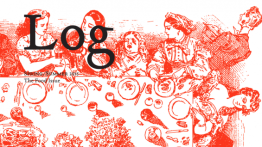Book Launch for Log 34: The Food Issue
Tuesday, July 21, 2015, 7 - 9pm

Guest edited by Jan Åman and Savinien Caracostea of AtelierSlice.
Cynthia Davidson will be in conversation with guest editors and contributors to celebrate the publication of Log 34: The Food Issue.
Why would an architecture journal devote an entire issue to thinking about food? Log 34: The Food Issue explores food in its many aspects and reveals a boundless realm of contemporary cultural production. In this Spring/Summer 2015 issue, contributions from inside and outside the worlds of food and architecture – from chefs and architects to artists, critics, entrepreneurs, lawyers, and eaters – highlight the many parallels between cuisine and architecture (beyond the basic needs for food and shelter) and demonstrate that food is everywhere and in everything. Guest edited by Jan Åman and Savinien Caracostea of AtelierSlice, Log 34 features renowned chefs, including Ferran Adrià, Dan Barber, Massimo Bottura, Magnus Nilsson, Jacques Pépin, and Christina Tosi, as well as critically acclaimed artists like Carsten Höller, Tobias Rehberger, and Rirkrit Tiravanija. In short, countless reasons to focus on food today, from the obvious to the surprising.
Located in the Arthur A. Houghton Jr. Gallery, 7 East 7th Street, 2nd Floor, between Third and Fourth Avenues




